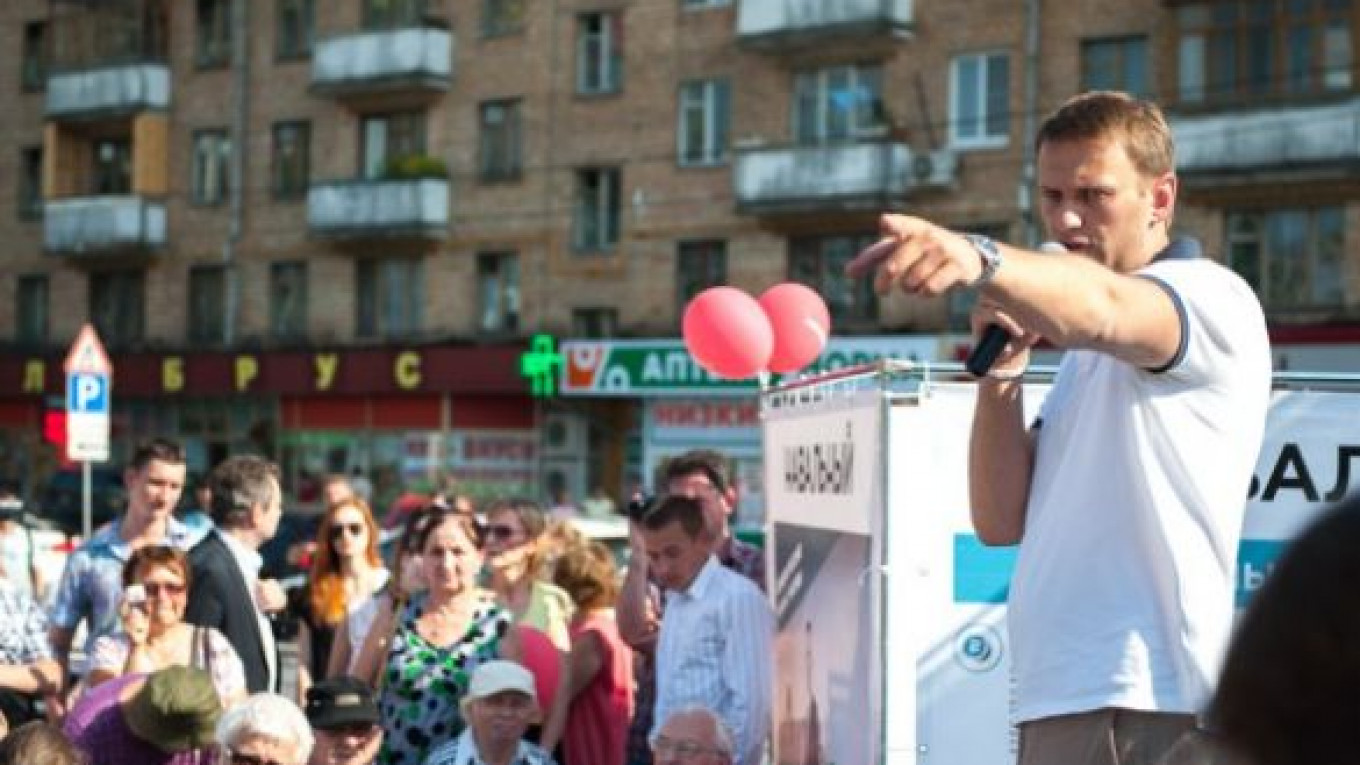Supporters of mayoral hopeful Alexei Navalny on Wednesday were struggling to find answers over an incident that took place Tuesday evening that saw police force their way into a central Moscow apartment to seize what they said were illegal campaign materials.
In a statement released Wednesday, police explained the incident by saying "a man who said he was an adviser for one of the mayoral candidates called at 5 p.m. and said there were illegal campaign materials in the given apartment."
Media reports said police showed up at the apartment with the Emergency Situations Ministry, mayoral candidate Nikolai Levichev and his supporters at 6 p.m., though they managed to get in only three hours later.
Initial reports by RIA Novosti said the Emergency Situations Ministry had arrived in response to a possible fire threat and attempted to get in to the apartment after seeing smoke. The ministry subsequently repudiated that report, however, saying the firefighters saw no sign of a fire and left without opening the door.
The incident came just a day after the Prosecutor General's Office said Navalny's election campaign was likely financed from abroad by more than 300 foreign individuals and enterprises from the U.S., Finland, Britain, Switzerland and Canada that transferred money to Navalny allies' digital wallets — a move which supporters said was a pretext to exclude Navalny from the race.
Tuesday's bizarre apartment raid has prompted similar speculation. Some two tons of posters and stickers were reportedly found at the apartment on Chistoprudny Bulvar, though they lacked the mandatory labels indicating that they were paid for by Navalny's official campaign fund, meaning they violate campaign rules.
Navalny's campaign headquarters said that it had nothing to do with the materials and that the people living in the apartment were supporters of Navalny who operated "independently of the Navalny campaign staff."
The four men who were in the apartment at the time of the raid said they had not done anything illegal and had tried to open the door for police but could not because the lock was broken. All four were detained and later charged with disobeying the orders of a police officer and issued a 1,000-ruble fine ($30).
The detained men said police had no search warrant to legally grant them entry. Police said they had gotten permission to enter from the owner of the apartment after the men refused to open the door, however.
According to a statement issued by Navalny's office, there was nothing illegal about the materials found at the apartment, all of which were produced by the Brothers of Navalny, an anonymous group that has held several protests recently in support of the opposition leader.
It is unclear why the materials were believed to be illegal. Levichev initially claimed that the materials produced in the apartment were in support of Sergei Mitrokhin, the Yabloko party's mayoral candidate, but he later apologized and turned the accusations toward Navalny.
Levichev's fumbled accusation has prompted some to question the motives behind it.
"Levichev has nothing to lose; he's a complete underdog in this election campaign," said Pavel Salin, director of the Moscow Financial University's Center for Political Research.
According to Salin, all recent attacks on Navalny are intended to put media pressure on him because his approval rating is higher than authorities thought it would be.
The latest VTsOM poll says acting Mayor Sergei Sobyanin is expected to gain 67.4 percent of votes, Navalny is in second place with 13 percent, and Levichev holds last place with 3.3 percent, along with Mikhail Degtyarov from the Liberal Democratic Party. Ivan Melnikov from the Communist party is expected to get 6.5 percent and Mitrokhin 5.4 percent.
On Wednesday, Levichev submitted a complaint to the Moscow Elections Commission stating that the apartment on Chistoprudny Bulvar was serving as Navalny's "illegal campaign headquarters."
In response to Levichev's complaint, the head of the commission, Valentin Gorbunov, said "It is a shame that a candidate who positions himself as a fighter of corruption himself uses dirty technologies and shadow schemes in his election campaign," Itar-Tass reported.
Salin said pressure on Navalny would probably continue.
"As a last resort he will be jailed, but authorities aren't ready for such a radical decision yet," he said, adding that "one can only guess what authorities can use against him, but certain agencies definitely have information that could be damaging to him."
A Message from The Moscow Times:
Dear readers,
We are facing unprecedented challenges. Russia's Prosecutor General's Office has designated The Moscow Times as an "undesirable" organization, criminalizing our work and putting our staff at risk of prosecution. This follows our earlier unjust labeling as a "foreign agent."
These actions are direct attempts to silence independent journalism in Russia. The authorities claim our work "discredits the decisions of the Russian leadership." We see things differently: we strive to provide accurate, unbiased reporting on Russia.
We, the journalists of The Moscow Times, refuse to be silenced. But to continue our work, we need your help.
Your support, no matter how small, makes a world of difference. If you can, please support us monthly starting from just $2. It's quick to set up, and every contribution makes a significant impact.
By supporting The Moscow Times, you're defending open, independent journalism in the face of repression. Thank you for standing with us.
Remind me later.






